Nursing Older Patients: Critical Care, Skills, and Priorities Report
VerifiedAdded on 2022/09/01
|9
|2138
|14
Report
AI Summary
This report delves into the multifaceted aspects of nursing care for elderly patients, addressing critical conditions and the specialized care required in such scenarios. It outlines essential health management skills, emphasizing effective communication, empathy, patience, and observation. The report further explores the physiological changes associated with aging, such as cardiovascular alterations, musculoskeletal issues, and digestive system challenges, and discusses strategies for their management, including lifestyle adjustments and medical interventions. Additionally, it examines how caring for aging individuals can shift a nurse's priorities, considering the complex needs, communication barriers, and emotional demands inherent in geriatric care. The report utilizes a variety of sources to provide a well-rounded overview of nursing care for older patients.
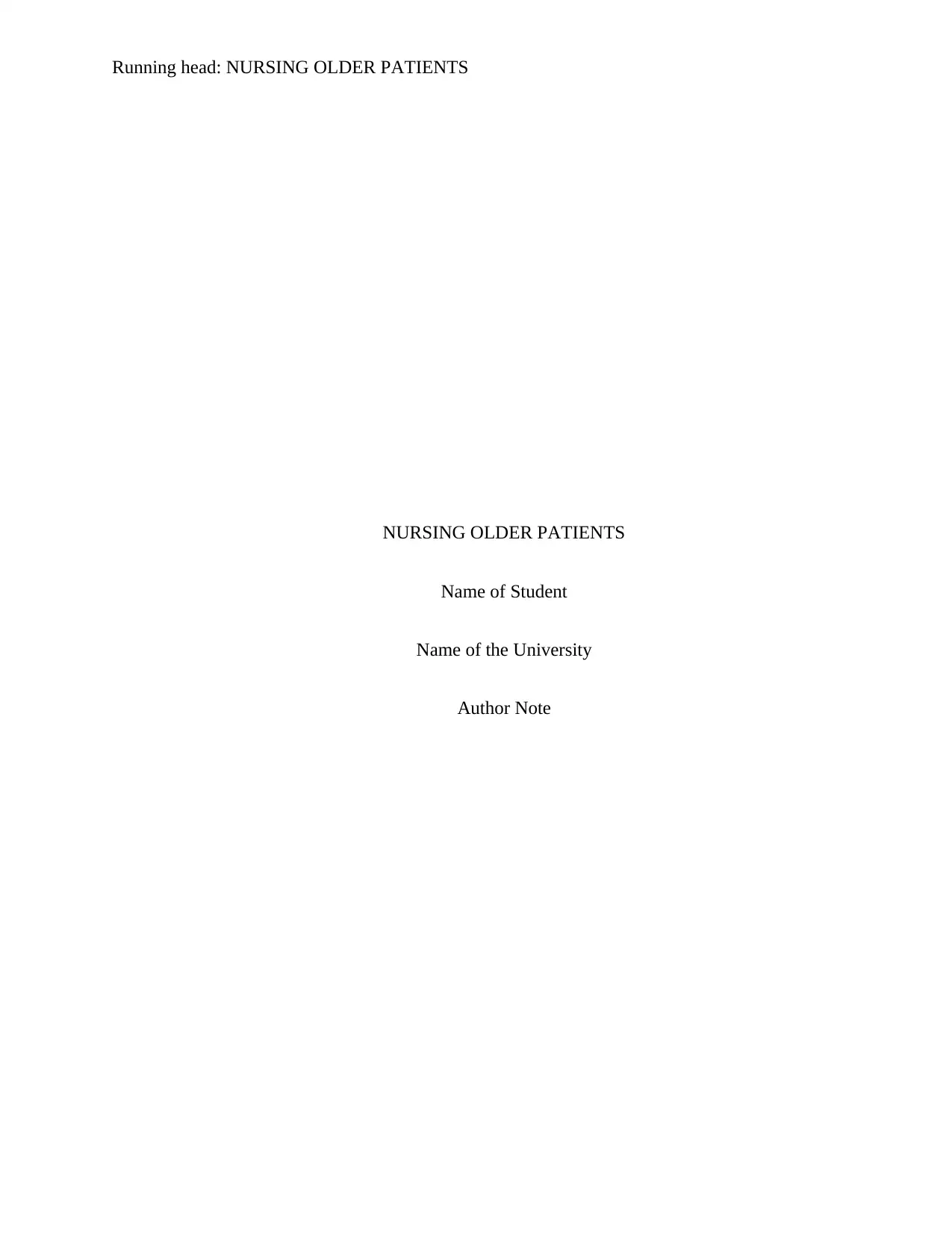
Running head: NURSING OLDER PATIENTS
NURSING OLDER PATIENTS
Name of Student
Name of the University
Author Note
NURSING OLDER PATIENTS
Name of Student
Name of the University
Author Note
Paraphrase This Document
Need a fresh take? Get an instant paraphrase of this document with our AI Paraphraser
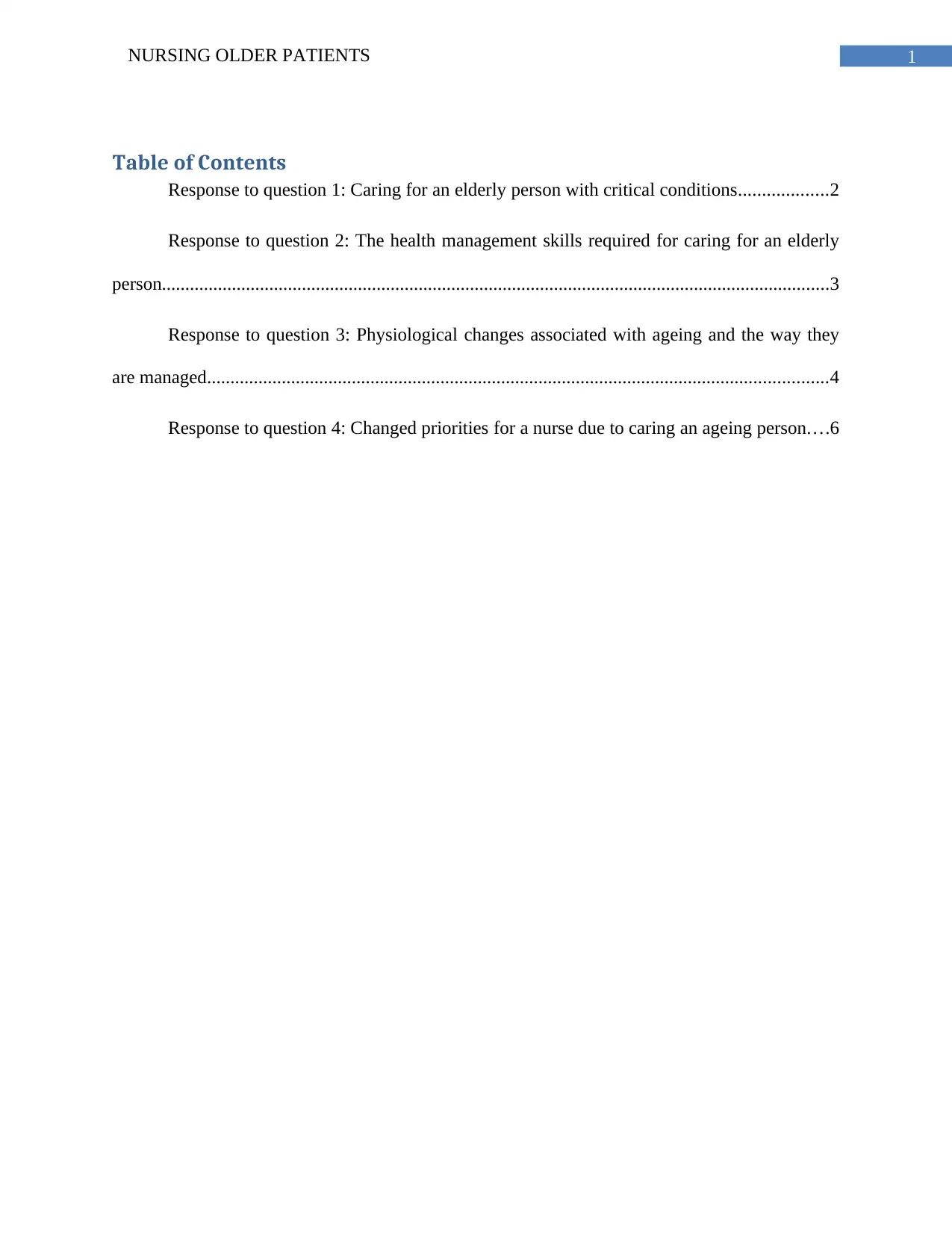
1NURSING OLDER PATIENTS
Table of Contents
Response to question 1: Caring for an elderly person with critical conditions...................2
Response to question 2: The health management skills required for caring for an elderly
person...............................................................................................................................................3
Response to question 3: Physiological changes associated with ageing and the way they
are managed.....................................................................................................................................4
Response to question 4: Changed priorities for a nurse due to caring an ageing person....6
Table of Contents
Response to question 1: Caring for an elderly person with critical conditions...................2
Response to question 2: The health management skills required for caring for an elderly
person...............................................................................................................................................3
Response to question 3: Physiological changes associated with ageing and the way they
are managed.....................................................................................................................................4
Response to question 4: Changed priorities for a nurse due to caring an ageing person....6
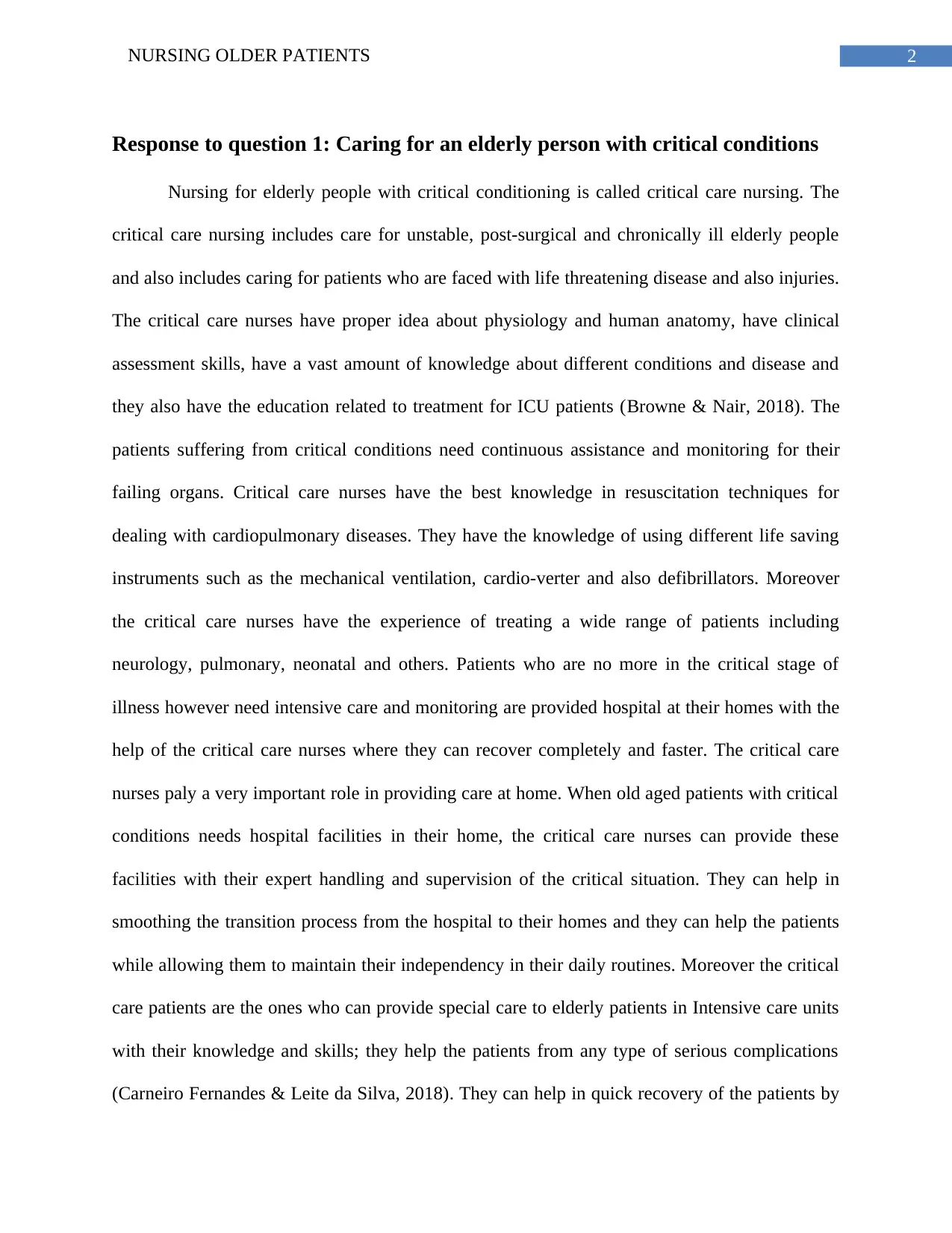
2NURSING OLDER PATIENTS
Response to question 1: Caring for an elderly person with critical conditions
Nursing for elderly people with critical conditioning is called critical care nursing. The
critical care nursing includes care for unstable, post-surgical and chronically ill elderly people
and also includes caring for patients who are faced with life threatening disease and also injuries.
The critical care nurses have proper idea about physiology and human anatomy, have clinical
assessment skills, have a vast amount of knowledge about different conditions and disease and
they also have the education related to treatment for ICU patients (Browne & Nair, 2018). The
patients suffering from critical conditions need continuous assistance and monitoring for their
failing organs. Critical care nurses have the best knowledge in resuscitation techniques for
dealing with cardiopulmonary diseases. They have the knowledge of using different life saving
instruments such as the mechanical ventilation, cardio-verter and also defibrillators. Moreover
the critical care nurses have the experience of treating a wide range of patients including
neurology, pulmonary, neonatal and others. Patients who are no more in the critical stage of
illness however need intensive care and monitoring are provided hospital at their homes with the
help of the critical care nurses where they can recover completely and faster. The critical care
nurses paly a very important role in providing care at home. When old aged patients with critical
conditions needs hospital facilities in their home, the critical care nurses can provide these
facilities with their expert handling and supervision of the critical situation. They can help in
smoothing the transition process from the hospital to their homes and they can help the patients
while allowing them to maintain their independency in their daily routines. Moreover the critical
care patients are the ones who can provide special care to elderly patients in Intensive care units
with their knowledge and skills; they help the patients from any type of serious complications
(Carneiro Fernandes & Leite da Silva, 2018). They can help in quick recovery of the patients by
Response to question 1: Caring for an elderly person with critical conditions
Nursing for elderly people with critical conditioning is called critical care nursing. The
critical care nursing includes care for unstable, post-surgical and chronically ill elderly people
and also includes caring for patients who are faced with life threatening disease and also injuries.
The critical care nurses have proper idea about physiology and human anatomy, have clinical
assessment skills, have a vast amount of knowledge about different conditions and disease and
they also have the education related to treatment for ICU patients (Browne & Nair, 2018). The
patients suffering from critical conditions need continuous assistance and monitoring for their
failing organs. Critical care nurses have the best knowledge in resuscitation techniques for
dealing with cardiopulmonary diseases. They have the knowledge of using different life saving
instruments such as the mechanical ventilation, cardio-verter and also defibrillators. Moreover
the critical care nurses have the experience of treating a wide range of patients including
neurology, pulmonary, neonatal and others. Patients who are no more in the critical stage of
illness however need intensive care and monitoring are provided hospital at their homes with the
help of the critical care nurses where they can recover completely and faster. The critical care
nurses paly a very important role in providing care at home. When old aged patients with critical
conditions needs hospital facilities in their home, the critical care nurses can provide these
facilities with their expert handling and supervision of the critical situation. They can help in
smoothing the transition process from the hospital to their homes and they can help the patients
while allowing them to maintain their independency in their daily routines. Moreover the critical
care patients are the ones who can provide special care to elderly patients in Intensive care units
with their knowledge and skills; they help the patients from any type of serious complications
(Carneiro Fernandes & Leite da Silva, 2018). They can help in quick recovery of the patients by
⊘ This is a preview!⊘
Do you want full access?
Subscribe today to unlock all pages.

Trusted by 1+ million students worldwide
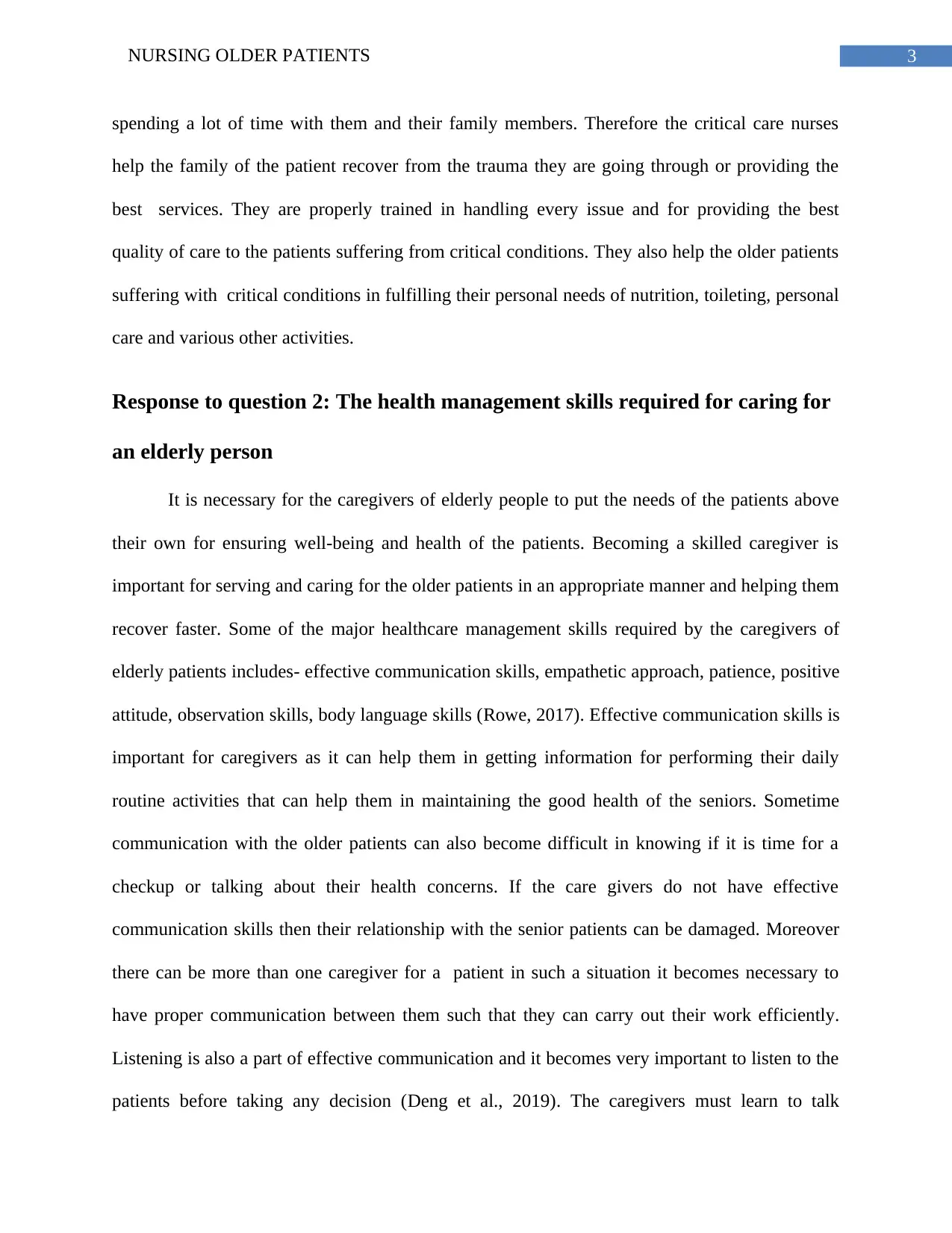
3NURSING OLDER PATIENTS
spending a lot of time with them and their family members. Therefore the critical care nurses
help the family of the patient recover from the trauma they are going through or providing the
best services. They are properly trained in handling every issue and for providing the best
quality of care to the patients suffering from critical conditions. They also help the older patients
suffering with critical conditions in fulfilling their personal needs of nutrition, toileting, personal
care and various other activities.
Response to question 2: The health management skills required for caring for
an elderly person
It is necessary for the caregivers of elderly people to put the needs of the patients above
their own for ensuring well-being and health of the patients. Becoming a skilled caregiver is
important for serving and caring for the older patients in an appropriate manner and helping them
recover faster. Some of the major healthcare management skills required by the caregivers of
elderly patients includes- effective communication skills, empathetic approach, patience, positive
attitude, observation skills, body language skills (Rowe, 2017). Effective communication skills is
important for caregivers as it can help them in getting information for performing their daily
routine activities that can help them in maintaining the good health of the seniors. Sometime
communication with the older patients can also become difficult in knowing if it is time for a
checkup or talking about their health concerns. If the care givers do not have effective
communication skills then their relationship with the senior patients can be damaged. Moreover
there can be more than one caregiver for a patient in such a situation it becomes necessary to
have proper communication between them such that they can carry out their work efficiently.
Listening is also a part of effective communication and it becomes very important to listen to the
patients before taking any decision (Deng et al., 2019). The caregivers must learn to talk
spending a lot of time with them and their family members. Therefore the critical care nurses
help the family of the patient recover from the trauma they are going through or providing the
best services. They are properly trained in handling every issue and for providing the best
quality of care to the patients suffering from critical conditions. They also help the older patients
suffering with critical conditions in fulfilling their personal needs of nutrition, toileting, personal
care and various other activities.
Response to question 2: The health management skills required for caring for
an elderly person
It is necessary for the caregivers of elderly people to put the needs of the patients above
their own for ensuring well-being and health of the patients. Becoming a skilled caregiver is
important for serving and caring for the older patients in an appropriate manner and helping them
recover faster. Some of the major healthcare management skills required by the caregivers of
elderly patients includes- effective communication skills, empathetic approach, patience, positive
attitude, observation skills, body language skills (Rowe, 2017). Effective communication skills is
important for caregivers as it can help them in getting information for performing their daily
routine activities that can help them in maintaining the good health of the seniors. Sometime
communication with the older patients can also become difficult in knowing if it is time for a
checkup or talking about their health concerns. If the care givers do not have effective
communication skills then their relationship with the senior patients can be damaged. Moreover
there can be more than one caregiver for a patient in such a situation it becomes necessary to
have proper communication between them such that they can carry out their work efficiently.
Listening is also a part of effective communication and it becomes very important to listen to the
patients before taking any decision (Deng et al., 2019). The caregivers must learn to talk
Paraphrase This Document
Need a fresh take? Get an instant paraphrase of this document with our AI Paraphraser
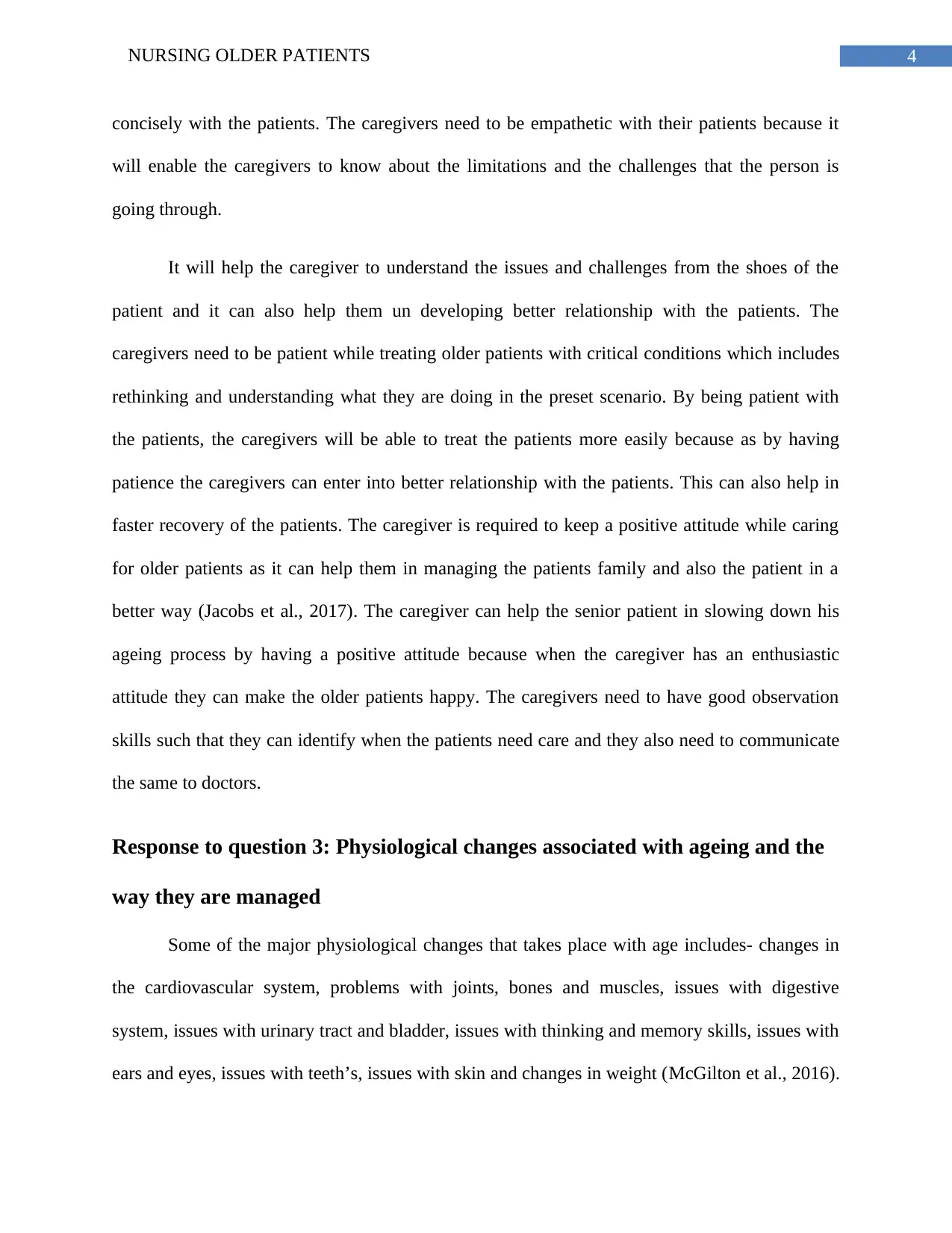
4NURSING OLDER PATIENTS
concisely with the patients. The caregivers need to be empathetic with their patients because it
will enable the caregivers to know about the limitations and the challenges that the person is
going through.
It will help the caregiver to understand the issues and challenges from the shoes of the
patient and it can also help them un developing better relationship with the patients. The
caregivers need to be patient while treating older patients with critical conditions which includes
rethinking and understanding what they are doing in the preset scenario. By being patient with
the patients, the caregivers will be able to treat the patients more easily because as by having
patience the caregivers can enter into better relationship with the patients. This can also help in
faster recovery of the patients. The caregiver is required to keep a positive attitude while caring
for older patients as it can help them in managing the patients family and also the patient in a
better way (Jacobs et al., 2017). The caregiver can help the senior patient in slowing down his
ageing process by having a positive attitude because when the caregiver has an enthusiastic
attitude they can make the older patients happy. The caregivers need to have good observation
skills such that they can identify when the patients need care and they also need to communicate
the same to doctors.
Response to question 3: Physiological changes associated with ageing and the
way they are managed
Some of the major physiological changes that takes place with age includes- changes in
the cardiovascular system, problems with joints, bones and muscles, issues with digestive
system, issues with urinary tract and bladder, issues with thinking and memory skills, issues with
ears and eyes, issues with teeth’s, issues with skin and changes in weight (McGilton et al., 2016).
concisely with the patients. The caregivers need to be empathetic with their patients because it
will enable the caregivers to know about the limitations and the challenges that the person is
going through.
It will help the caregiver to understand the issues and challenges from the shoes of the
patient and it can also help them un developing better relationship with the patients. The
caregivers need to be patient while treating older patients with critical conditions which includes
rethinking and understanding what they are doing in the preset scenario. By being patient with
the patients, the caregivers will be able to treat the patients more easily because as by having
patience the caregivers can enter into better relationship with the patients. This can also help in
faster recovery of the patients. The caregiver is required to keep a positive attitude while caring
for older patients as it can help them in managing the patients family and also the patient in a
better way (Jacobs et al., 2017). The caregiver can help the senior patient in slowing down his
ageing process by having a positive attitude because when the caregiver has an enthusiastic
attitude they can make the older patients happy. The caregivers need to have good observation
skills such that they can identify when the patients need care and they also need to communicate
the same to doctors.
Response to question 3: Physiological changes associated with ageing and the
way they are managed
Some of the major physiological changes that takes place with age includes- changes in
the cardiovascular system, problems with joints, bones and muscles, issues with digestive
system, issues with urinary tract and bladder, issues with thinking and memory skills, issues with
ears and eyes, issues with teeth’s, issues with skin and changes in weight (McGilton et al., 2016).
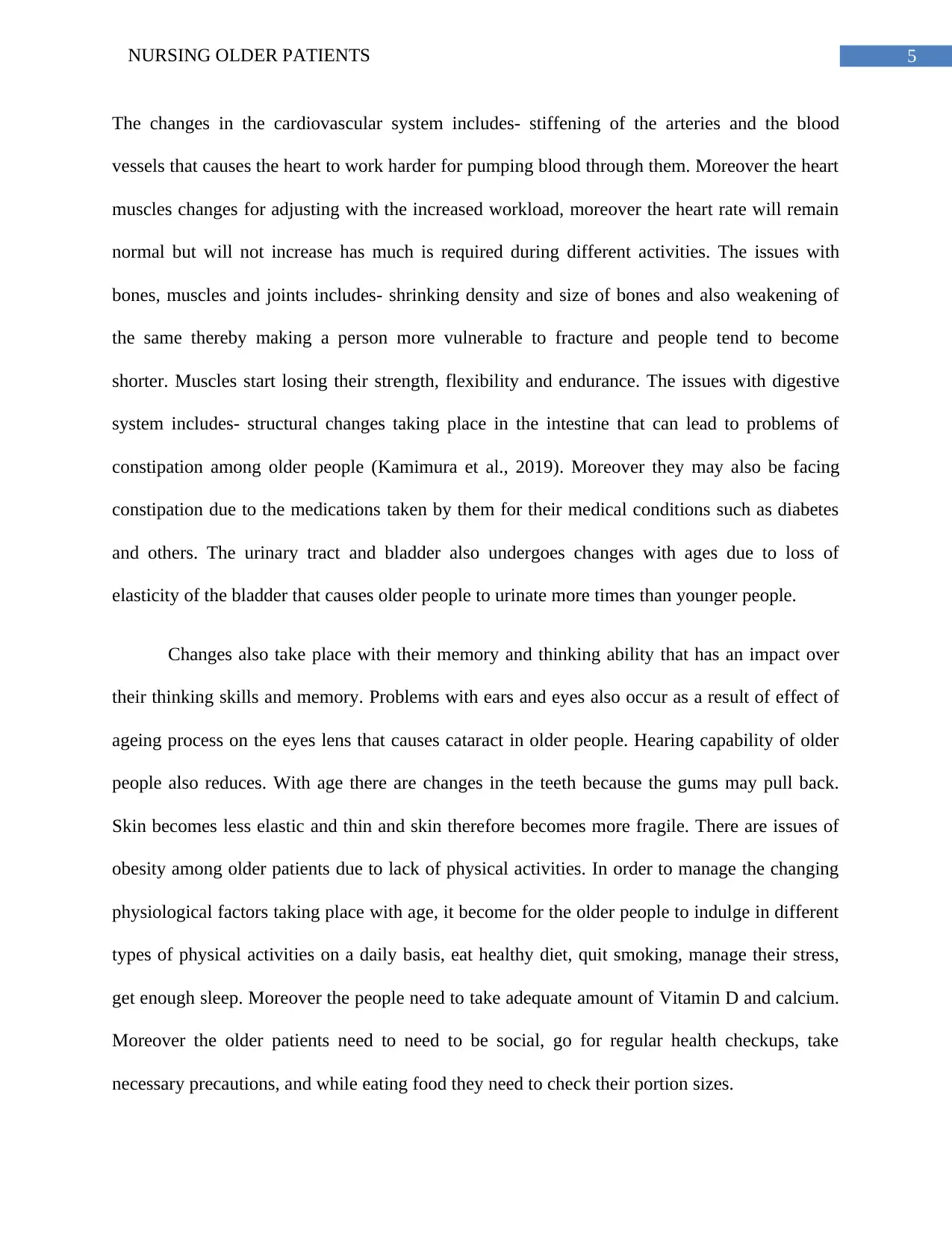
5NURSING OLDER PATIENTS
The changes in the cardiovascular system includes- stiffening of the arteries and the blood
vessels that causes the heart to work harder for pumping blood through them. Moreover the heart
muscles changes for adjusting with the increased workload, moreover the heart rate will remain
normal but will not increase has much is required during different activities. The issues with
bones, muscles and joints includes- shrinking density and size of bones and also weakening of
the same thereby making a person more vulnerable to fracture and people tend to become
shorter. Muscles start losing their strength, flexibility and endurance. The issues with digestive
system includes- structural changes taking place in the intestine that can lead to problems of
constipation among older people (Kamimura et al., 2019). Moreover they may also be facing
constipation due to the medications taken by them for their medical conditions such as diabetes
and others. The urinary tract and bladder also undergoes changes with ages due to loss of
elasticity of the bladder that causes older people to urinate more times than younger people.
Changes also take place with their memory and thinking ability that has an impact over
their thinking skills and memory. Problems with ears and eyes also occur as a result of effect of
ageing process on the eyes lens that causes cataract in older people. Hearing capability of older
people also reduces. With age there are changes in the teeth because the gums may pull back.
Skin becomes less elastic and thin and skin therefore becomes more fragile. There are issues of
obesity among older patients due to lack of physical activities. In order to manage the changing
physiological factors taking place with age, it become for the older people to indulge in different
types of physical activities on a daily basis, eat healthy diet, quit smoking, manage their stress,
get enough sleep. Moreover the people need to take adequate amount of Vitamin D and calcium.
Moreover the older patients need to need to be social, go for regular health checkups, take
necessary precautions, and while eating food they need to check their portion sizes.
The changes in the cardiovascular system includes- stiffening of the arteries and the blood
vessels that causes the heart to work harder for pumping blood through them. Moreover the heart
muscles changes for adjusting with the increased workload, moreover the heart rate will remain
normal but will not increase has much is required during different activities. The issues with
bones, muscles and joints includes- shrinking density and size of bones and also weakening of
the same thereby making a person more vulnerable to fracture and people tend to become
shorter. Muscles start losing their strength, flexibility and endurance. The issues with digestive
system includes- structural changes taking place in the intestine that can lead to problems of
constipation among older people (Kamimura et al., 2019). Moreover they may also be facing
constipation due to the medications taken by them for their medical conditions such as diabetes
and others. The urinary tract and bladder also undergoes changes with ages due to loss of
elasticity of the bladder that causes older people to urinate more times than younger people.
Changes also take place with their memory and thinking ability that has an impact over
their thinking skills and memory. Problems with ears and eyes also occur as a result of effect of
ageing process on the eyes lens that causes cataract in older people. Hearing capability of older
people also reduces. With age there are changes in the teeth because the gums may pull back.
Skin becomes less elastic and thin and skin therefore becomes more fragile. There are issues of
obesity among older patients due to lack of physical activities. In order to manage the changing
physiological factors taking place with age, it become for the older people to indulge in different
types of physical activities on a daily basis, eat healthy diet, quit smoking, manage their stress,
get enough sleep. Moreover the people need to take adequate amount of Vitamin D and calcium.
Moreover the older patients need to need to be social, go for regular health checkups, take
necessary precautions, and while eating food they need to check their portion sizes.
⊘ This is a preview!⊘
Do you want full access?
Subscribe today to unlock all pages.

Trusted by 1+ million students worldwide
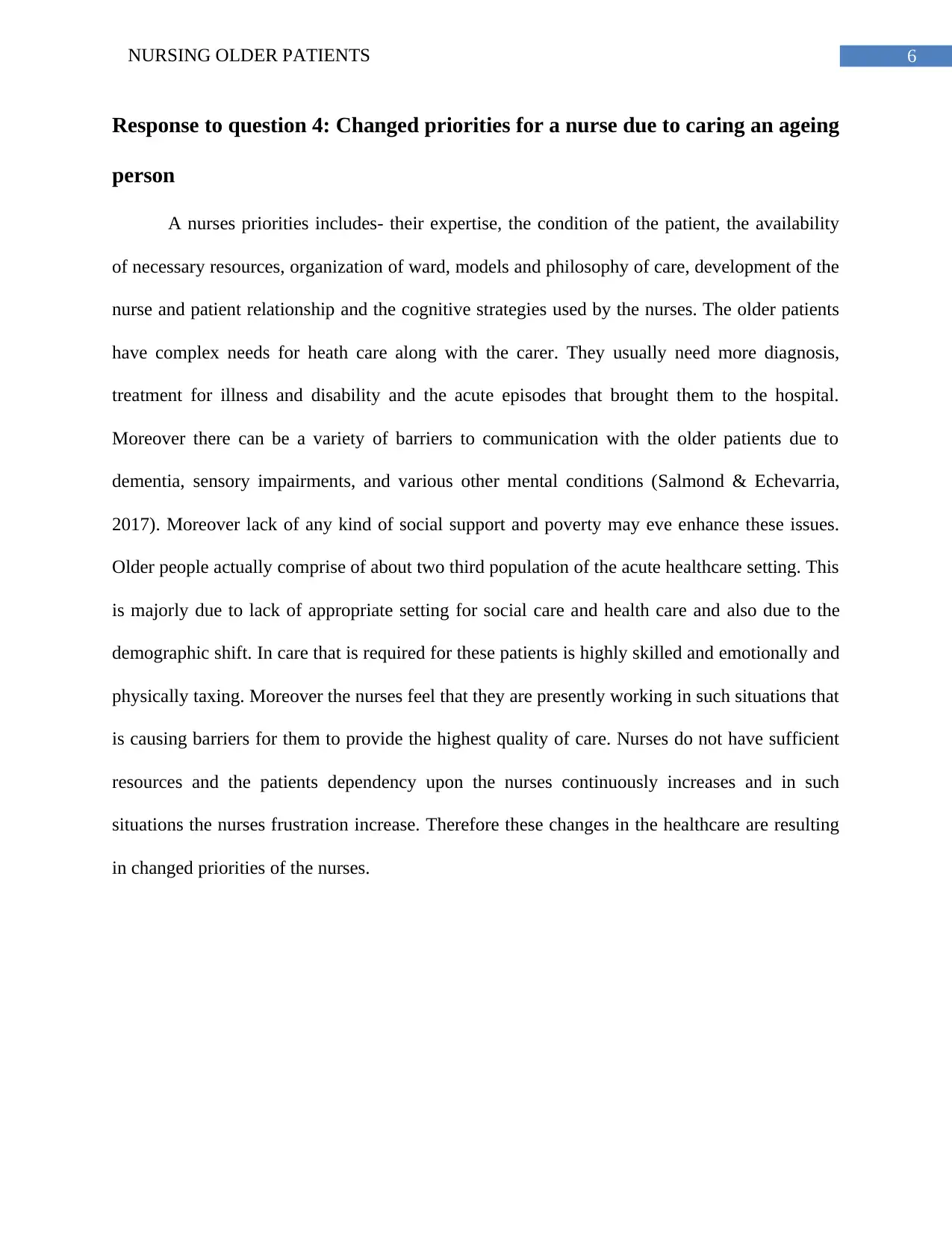
6NURSING OLDER PATIENTS
Response to question 4: Changed priorities for a nurse due to caring an ageing
person
A nurses priorities includes- their expertise, the condition of the patient, the availability
of necessary resources, organization of ward, models and philosophy of care, development of the
nurse and patient relationship and the cognitive strategies used by the nurses. The older patients
have complex needs for heath care along with the carer. They usually need more diagnosis,
treatment for illness and disability and the acute episodes that brought them to the hospital.
Moreover there can be a variety of barriers to communication with the older patients due to
dementia, sensory impairments, and various other mental conditions (Salmond & Echevarria,
2017). Moreover lack of any kind of social support and poverty may eve enhance these issues.
Older people actually comprise of about two third population of the acute healthcare setting. This
is majorly due to lack of appropriate setting for social care and health care and also due to the
demographic shift. In care that is required for these patients is highly skilled and emotionally and
physically taxing. Moreover the nurses feel that they are presently working in such situations that
is causing barriers for them to provide the highest quality of care. Nurses do not have sufficient
resources and the patients dependency upon the nurses continuously increases and in such
situations the nurses frustration increase. Therefore these changes in the healthcare are resulting
in changed priorities of the nurses.
Response to question 4: Changed priorities for a nurse due to caring an ageing
person
A nurses priorities includes- their expertise, the condition of the patient, the availability
of necessary resources, organization of ward, models and philosophy of care, development of the
nurse and patient relationship and the cognitive strategies used by the nurses. The older patients
have complex needs for heath care along with the carer. They usually need more diagnosis,
treatment for illness and disability and the acute episodes that brought them to the hospital.
Moreover there can be a variety of barriers to communication with the older patients due to
dementia, sensory impairments, and various other mental conditions (Salmond & Echevarria,
2017). Moreover lack of any kind of social support and poverty may eve enhance these issues.
Older people actually comprise of about two third population of the acute healthcare setting. This
is majorly due to lack of appropriate setting for social care and health care and also due to the
demographic shift. In care that is required for these patients is highly skilled and emotionally and
physically taxing. Moreover the nurses feel that they are presently working in such situations that
is causing barriers for them to provide the highest quality of care. Nurses do not have sufficient
resources and the patients dependency upon the nurses continuously increases and in such
situations the nurses frustration increase. Therefore these changes in the healthcare are resulting
in changed priorities of the nurses.
Paraphrase This Document
Need a fresh take? Get an instant paraphrase of this document with our AI Paraphraser
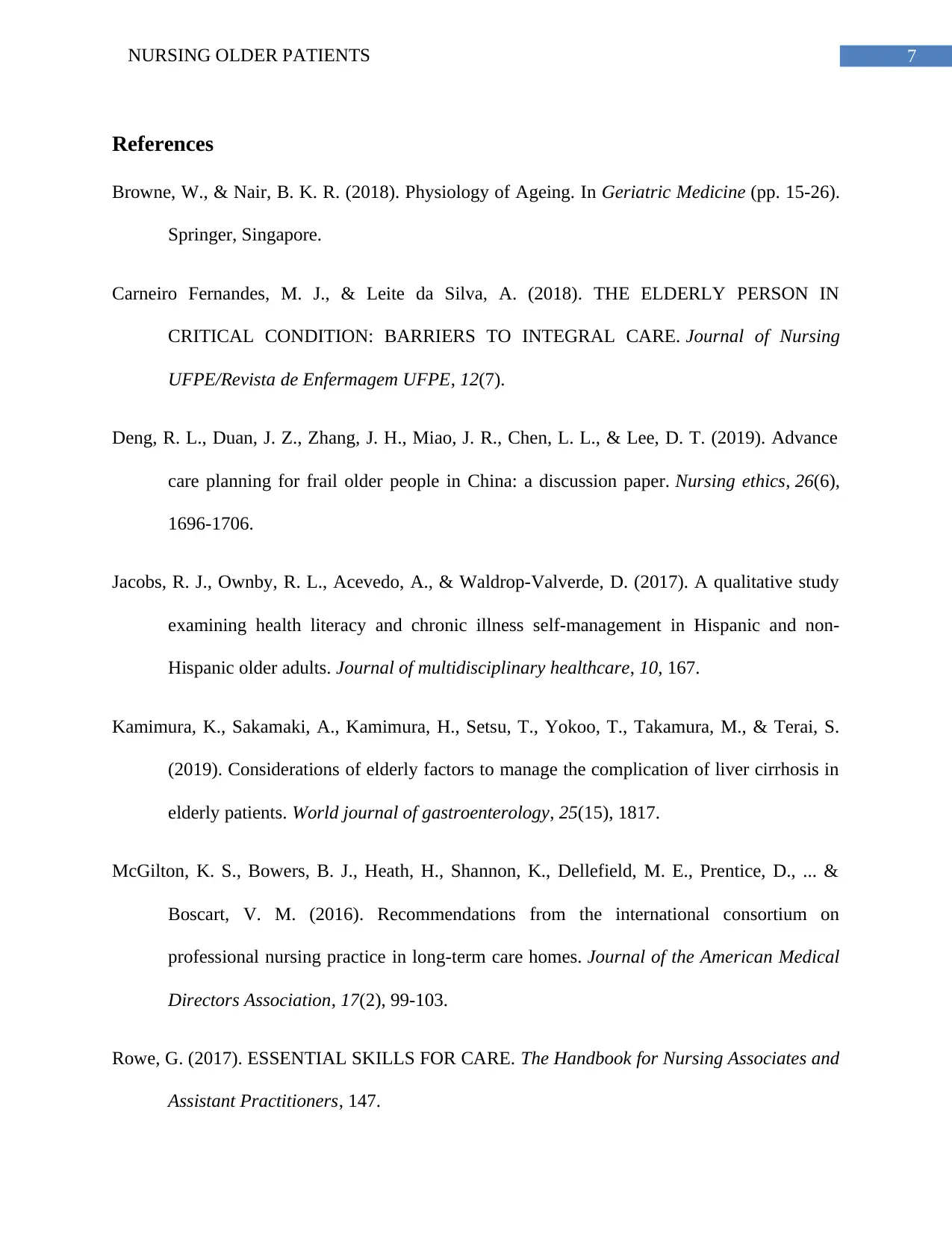
7NURSING OLDER PATIENTS
References
Browne, W., & Nair, B. K. R. (2018). Physiology of Ageing. In Geriatric Medicine (pp. 15-26).
Springer, Singapore.
Carneiro Fernandes, M. J., & Leite da Silva, A. (2018). THE ELDERLY PERSON IN
CRITICAL CONDITION: BARRIERS TO INTEGRAL CARE. Journal of Nursing
UFPE/Revista de Enfermagem UFPE, 12(7).
Deng, R. L., Duan, J. Z., Zhang, J. H., Miao, J. R., Chen, L. L., & Lee, D. T. (2019). Advance
care planning for frail older people in China: a discussion paper. Nursing ethics, 26(6),
1696-1706.
Jacobs, R. J., Ownby, R. L., Acevedo, A., & Waldrop-Valverde, D. (2017). A qualitative study
examining health literacy and chronic illness self-management in Hispanic and non-
Hispanic older adults. Journal of multidisciplinary healthcare, 10, 167.
Kamimura, K., Sakamaki, A., Kamimura, H., Setsu, T., Yokoo, T., Takamura, M., & Terai, S.
(2019). Considerations of elderly factors to manage the complication of liver cirrhosis in
elderly patients. World journal of gastroenterology, 25(15), 1817.
McGilton, K. S., Bowers, B. J., Heath, H., Shannon, K., Dellefield, M. E., Prentice, D., ... &
Boscart, V. M. (2016). Recommendations from the international consortium on
professional nursing practice in long-term care homes. Journal of the American Medical
Directors Association, 17(2), 99-103.
Rowe, G. (2017). ESSENTIAL SKILLS FOR CARE. The Handbook for Nursing Associates and
Assistant Practitioners, 147.
References
Browne, W., & Nair, B. K. R. (2018). Physiology of Ageing. In Geriatric Medicine (pp. 15-26).
Springer, Singapore.
Carneiro Fernandes, M. J., & Leite da Silva, A. (2018). THE ELDERLY PERSON IN
CRITICAL CONDITION: BARRIERS TO INTEGRAL CARE. Journal of Nursing
UFPE/Revista de Enfermagem UFPE, 12(7).
Deng, R. L., Duan, J. Z., Zhang, J. H., Miao, J. R., Chen, L. L., & Lee, D. T. (2019). Advance
care planning for frail older people in China: a discussion paper. Nursing ethics, 26(6),
1696-1706.
Jacobs, R. J., Ownby, R. L., Acevedo, A., & Waldrop-Valverde, D. (2017). A qualitative study
examining health literacy and chronic illness self-management in Hispanic and non-
Hispanic older adults. Journal of multidisciplinary healthcare, 10, 167.
Kamimura, K., Sakamaki, A., Kamimura, H., Setsu, T., Yokoo, T., Takamura, M., & Terai, S.
(2019). Considerations of elderly factors to manage the complication of liver cirrhosis in
elderly patients. World journal of gastroenterology, 25(15), 1817.
McGilton, K. S., Bowers, B. J., Heath, H., Shannon, K., Dellefield, M. E., Prentice, D., ... &
Boscart, V. M. (2016). Recommendations from the international consortium on
professional nursing practice in long-term care homes. Journal of the American Medical
Directors Association, 17(2), 99-103.
Rowe, G. (2017). ESSENTIAL SKILLS FOR CARE. The Handbook for Nursing Associates and
Assistant Practitioners, 147.
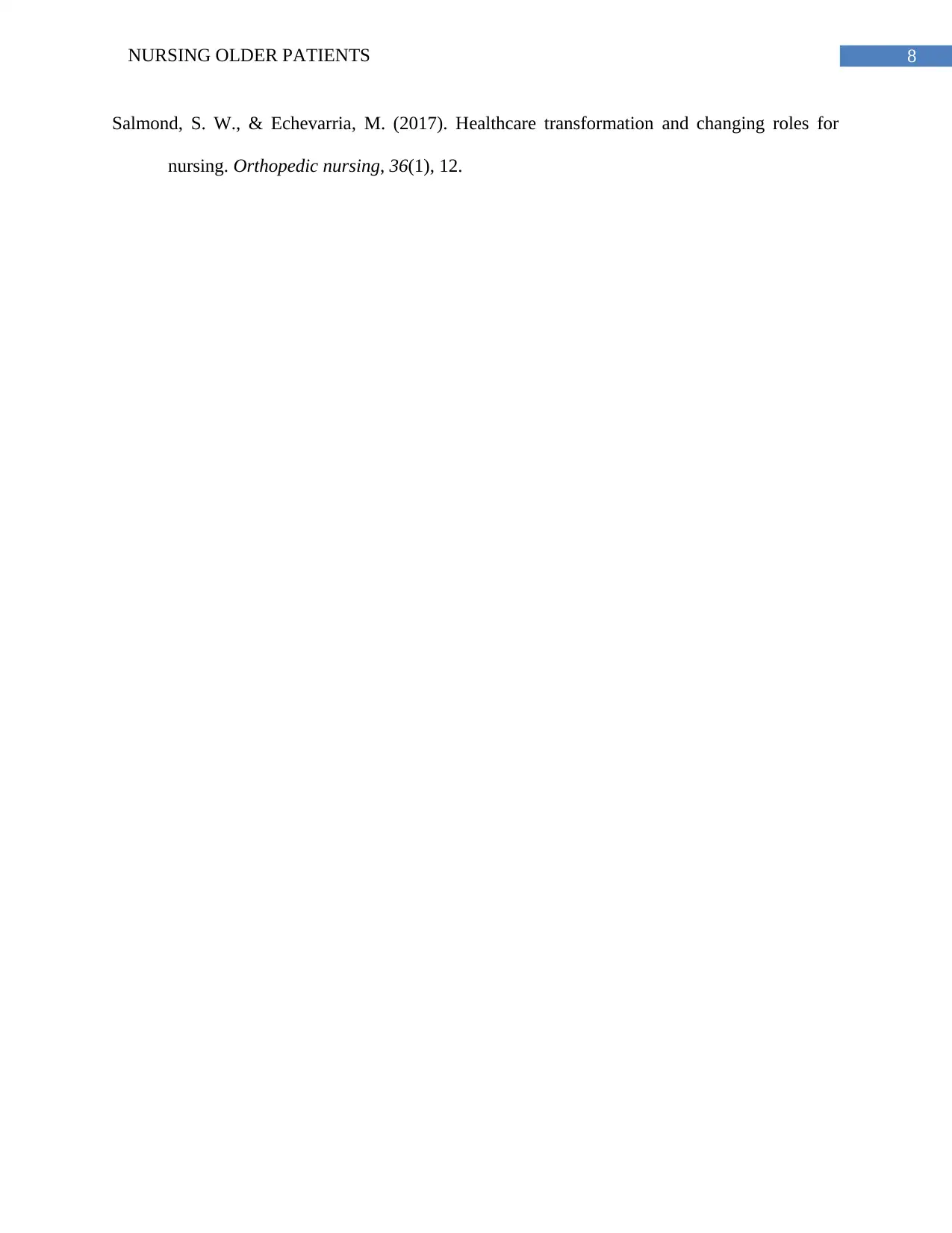
8NURSING OLDER PATIENTS
Salmond, S. W., & Echevarria, M. (2017). Healthcare transformation and changing roles for
nursing. Orthopedic nursing, 36(1), 12.
Salmond, S. W., & Echevarria, M. (2017). Healthcare transformation and changing roles for
nursing. Orthopedic nursing, 36(1), 12.
⊘ This is a preview!⊘
Do you want full access?
Subscribe today to unlock all pages.

Trusted by 1+ million students worldwide
1 out of 9
Related Documents
Your All-in-One AI-Powered Toolkit for Academic Success.
+13062052269
info@desklib.com
Available 24*7 on WhatsApp / Email
![[object Object]](/_next/static/media/star-bottom.7253800d.svg)
Unlock your academic potential
Copyright © 2020–2026 A2Z Services. All Rights Reserved. Developed and managed by ZUCOL.




